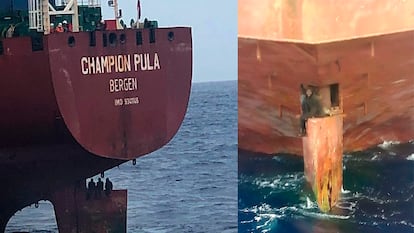The teen who came to Spain’s Canary Islands on top of a tanker’s rudder: ‘After the seventh day, we lost hope’
The 14-year-old from Nigeria shares with EL PAÍS his first-hand account of his 15-day odyssey from Lagos to the archipelago
After a dinner of vegetables and cookies, Prince, a 14-year-old from Nigeria who did not wish to use his real name, went for a walk in the beach town where he lived and overheard three men talking about their plans to leave for Europe as stowaways on a huge fuel tanker from the nearby port of Lagos. Within seconds, this slight teenager made the most important decision of his life: to join them. He boarded the Ocean Princess I and climbed up to the small compartment over the tanker’s rudder – a tiny space of about two square meters. He thought the journey would take a few hours, but it was 15 days before he reached Spain’s Canary Islands. Without food or anything but saltwater to drink.
He arrived in Las Palmas in Gran Canaria on November 23, weak and cold, his skin cracked and his jaw tight. Now, after two weeks of quarantine, he looks like any happy youngster again. “Sadness was not part of the plan,” he wrote on his Facebook page. Under his fictitious name, he talks about his trip in detail, but as though he were describing any normal episode of his life. This is the first-person account he gave to EL PAÍS.
“On the fourth day, the ship stopped. For a moment, we thought we must have reached a country, but all we saw was water. I was already very weak and hungry and losing my mind. All I could think about was a big plate of rice. It was the first time I drank saltwater. I held onto the ladder with one hand and with the other I collected the seawater. That was how I washed myself too. Until then, we had been more or less fine – there was hope; we were going to Europe. But from then on, everything got worse.
I knew that people were going to Europe. I saw their pictures on Facebook, but they were going by plane. I didn’t have money for a ticket or a visa. The money I earned selling fish and carrying bags for tourists was hardly enough to feed myself. I was confused and frustrated and I wanted to study. When I heard three men talking about getting on the Ocean Princess that night, I saw my chance. I had already seen the ship in the harbor. I knew where it was. I was determined.
We accepted that this was how we were going to die
I called my friend Mike to take me [to the ship] and we rowed the little boat we used for fishing. We had to row for almost an hour, from Tarkwa Bay beach where we lived to the docks at the port in Lagos. Mike didn’t want to come. He told me: ‘If you get there, I will regret not going with you,’ but he thought it was crazy and very dangerous. But I told myself: ‘If I die, I will die going to Europe.’ I climbed a ladder. When they saw me on the boat, the three men were shocked. They wanted to yell at me, to push me, but we were still in the port and they couldn’t make any noise or they would be discovered. I told them I was there for the same reason they were. They didn’t like it, but they had to accept it.
On the [fourth] day when the boat stopped, the men began to fight. We had to take turns sleeping in the space above the rudder. Only one person could fit there and there were many misunderstandings. I joined the argument, asked them to stop, to calm down. They almost killed me. One of them slapped me first, then punched me, and they ripped off my jacket. They wanted to throw me into the sea. I was crying and screaming. I was afraid. I think that was the worst moment of the whole trip – it was when I regretted getting on that ship. I thought I had made the wrong decision. Only one of them – who knew my uncle – defended me. ‘If you kill the kid, you’re going to jail,’ he said. They ended up leaving me alone. In the end, they felt sorry for me.
There was a moment, I think it was on the sixth day, when the level of the sea rose and the water splashed over us. We spent the day completely wet and only dried out when it was our turn to sleep in the area that was most sheltered. We were very cold, I was in flip-flops and I only had one jacket. My skin was completely white and dry.

When I slept, I dreamt that I threw myself into the water and swam and that the waves took me back to Nigeria, instead of Europe. I had other nightmares. I had a recurring one about five times. I dreamt that my grandmother, and sometimes other people, came to me with food. I felt she was very close, but I always woke up before she arrived. I felt like I couldn’t take anymore. I couldn’t keep my eyes open, the noise of the engine blocked my hearing, my whole body hurt, my stomach felt like I had gastroenteritis. It was not good to drink seawater, but there was no choice. It kept my throat wet, but then I got thirstier and thirstier. I would go down the ladder six or seven times a day and drink a little. When I peed, it was completely green.
After the seventh day, we lost hope. We accepted that this was how we were going to die. That’s when the men decided to use a hammer to let the crew know we were there. They spent three days pounding on the hull. Three days. We shouted, ‘Help! Help!’ But no one answered us. They ignored us. We were very weak. I never imagined it was going to be as hard.
By the fourth day, I was already very weak and hungry and losing my mind
I believe in God and I prayed and cried to him every day. I sang gospel songs that I learned in church in my head. I could hardly speak, but I tried to sing them out loud. But all I could hear was the engine.
One day before we arrived, we heard a noise in the hatch that leads to the rudder from inside the ship. It was someone banging. I think they wanted to know if we were alive. We shouted at them but they never opened the hatch. That’s why I’m telling you that I think they always knew we were there.
One night, 14 days later, I saw the lights of a city. I got excited and wanted to jump and swim ashore. The man who knew my uncle told me to wait, that it was very dangerous to do that in the dark. We would do it the next day, but before we could, we saw a boat with lights and someone shouting at us through a megaphone. We asked for help, we were very happy. When I saw the rescuer on the boat, the first thing I asked him was what country it was. ‘You are in Spain, in Las Palmas,’ he told me. I had arrived. The only thing I knew about Spain was soccer. I love Barça, I love [Barcelona player Leo] Messi. I nicknamed my little brother Iniesta [after Barcelona player Andrés Iniesta]. They gave us water and some cookies, but I couldn’t eat even though I was dying of hunger. My teeth didn’t work because of the cold and the vibrations of the ship. When they took me to the hospital the doctor was shocked because they could not get any blood out of me. I was on a drip for three days.
When I was brought to this center for young people, I was very happy. I couldn’t remember my sister’s number, but I remembered my grandmother’s and called her. She didn’t recognize my voice. She asked me, ‘Who is this?’ and I said, ‘It’s your grandson. I’m in Spain.’ She was shocked. We both cried a lot. I miss her very much. I also miss my sister. And my friend Mike and our dog Winnie. They were all very worried because they hadn’t heard from me in over a month. But now they are very happy. When they read my story, which had been published in the newspaper, I liked it. This is what is happening in some places. People are really suffering. People need help.”
English version by Heather Galloway.
Tu suscripción se está usando en otro dispositivo
¿Quieres añadir otro usuario a tu suscripción?
Si continúas leyendo en este dispositivo, no se podrá leer en el otro.
FlechaTu suscripción se está usando en otro dispositivo y solo puedes acceder a EL PAÍS desde un dispositivo a la vez.
Si quieres compartir tu cuenta, cambia tu suscripción a la modalidad Premium, así podrás añadir otro usuario. Cada uno accederá con su propia cuenta de email, lo que os permitirá personalizar vuestra experiencia en EL PAÍS.
¿Tienes una suscripción de empresa? Accede aquí para contratar más cuentas.
En el caso de no saber quién está usando tu cuenta, te recomendamos cambiar tu contraseña aquí.
Si decides continuar compartiendo tu cuenta, este mensaje se mostrará en tu dispositivo y en el de la otra persona que está usando tu cuenta de forma indefinida, afectando a tu experiencia de lectura. Puedes consultar aquí los términos y condiciones de la suscripción digital.









































